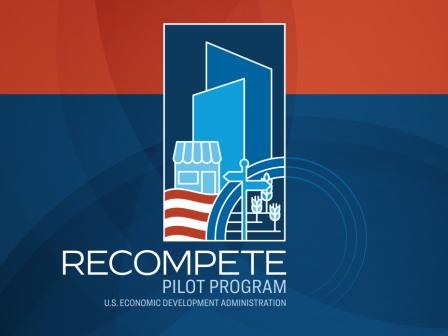
Archived Content
This site contains information that has been considered archived and will no longer be updated.
Recompete Finalists Submit Visions for Rebuilding Economic Opportunities
In April 2024, the 22 Recompete Pilot Program Finalists submitted their Phase 2 applications, sharing bold, targeted visions for combating long-term economic distress in each of their communities. Selected from an initial pool of 565 applications, these Finalists represent the top 10% of applicants from across the nation (read about the Finalists’ Phase 1 applications here (PDF)).
Each Finalist submitted an updated vision, with targeted investments, based on the unique characteristics of their community. These ranged from supporting rural and Tribal communities by addressing regional barriers to job creation, to addressing distress in large cities by targeting specific neighborhoods, to strengthening small- and medium-sized towns. Together, the finalists’ strategies underscore the goals of the Recompete Pilot Program: Rebuilding economic opportunity in distressed places by creating connections between poor neighborhoods and nearby jobs or developing new, regionally competitive sectors that create employment for existing residents.
A few months in, here’s what we’ve observed:
-
Recompete Plans reflected an integrated approach to workforce and economic development. In Phase 2, Recompete Finalists were asked to propose a set of different projects to improve their communities, resulting in a total of 148 unique project plans submitted. The majority of Finalists submitted a multi-pronged approach that included projects focused on both workforce and economic development. Each Finalist included a workforce training project, which was either coupled with a local job creation strategy or broader regional economic development efforts. The most frequently requested funding categories include:
-
Workforce training (31% of projects),
-
Wraparound services (20% of projects),
-
Critical infrastructure to support business growth (15% of projects),
-
Entrepreneurship and small business supports (12% of projects), and
-
Governance (12% of projects).
-
-
Recompete Plans represent a multi-stakeholder approach. In total, Recompete applicants reported over 1,000 complementary commitments from state and local governments, community-based organizations, industry, and other partners. Specifically:
-
1,000+ total organizations committed to the Recompete effort, of which roughly 200+ are community-based organizations;
-
26 labor organizations represented across 12 Recompete Finalists;
-
24 community colleges represented across 19 Recompete Finalists;
-
23 Minority-Serving Institutions represented across 14 Recompete Finalists, including Historically Black Colleges and Universities/Predominantly Black Institutions (6), Hispanic-Serving Institutions (11), and Tribal-Serving Institutions (3);
-
8 Tribal Governments represented across 4 Recompete Finalists; and
-
300+ private sector entities and industry groups represented across each of the 22 Finalists.
-
-
Finalists requested a broad range of tailored, wraparound supports to ensure non-employed residents can access and thrive in good jobs. Finalists requested over $140 million in wraparound support services alone (~16% of total funding). These included various offerings to meet residents where they are – whether for child and elder care, transportation, digital and financial wellbeing, addiction recovery, career navigation, or other gaps. Given the acute child and elder care pressures faced by Recompete residents, multiple Recompete Plans also include projects to bolster the long-term capacity of their local care economies, specifically by focusing on improving the supply of child and elder care providers (e.g., through technical assistance to smaller enterprises). Similarly, others proposed systemic changes to transit, healthcare, and economic systems.
-
Recompete Plans emphasize the need for large grants, allowing multiple projects to be tied together by a shared vision. On average, Recompete Finalists requested $38 million each for implementation funding. This translates to $840 million in total funding requests from the 22 Finalists. And while each Finalist proposed roughly 3-8 projects unique to their community, all Finalists submitted requests for governance plans and cross-cutting resources to ensure projects would be coordinated for greater collective impact (than if projects were individually implemented).
EDA will announce Phase 2 award winners later this summer and plans to award between 4-8 finalists with implementation funding. Through this funding, EDA aims to make transformational investments in distressed communities across the nation that catalyze renewed competitiveness and economic opportunity for workers and families in these areas. Click here to read more on how the Recompete Pilot Program is designed to accomplish this.
The excitement and demand for programs like the Recompete Pilot Program was reflected in the large number of applications. EDA received 565 applications from 49 states and 4 territories –the highest demand of any national program in EDA’s history. Equally noteworthy, over half of the applicants had never before applied for EDA funding.
The Recompete Pilot Program was authorized by the bipartisan CHIPS and Science Act, a key part of President Biden’s Investing in America agenda, which he signed into law in August 2022. The Act authorized $1 billion for the Recompete Pilot Program over five years. To date, Congress has appropriated $200 million, which enabled the 2023 launch of the program, but which does not yet allow EDA to realize this program’s vision of combating long-term economic distress across the country. Contingent on future appropriations, EDA anticipates awarding additional strategy development and implementation funding to distressed communities.
Learn more at eda.gov/Recompete.
